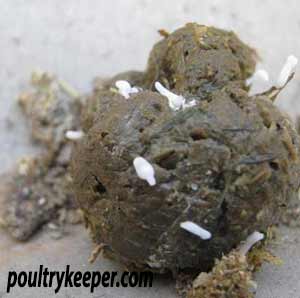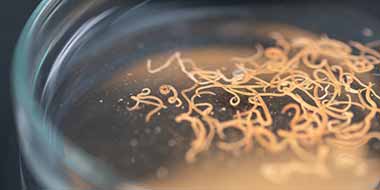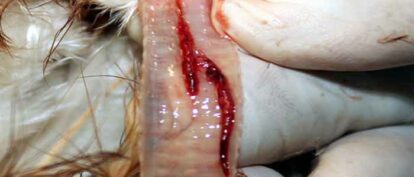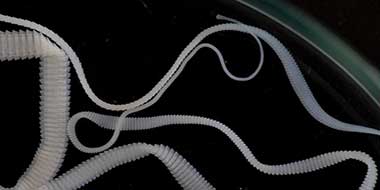Over the past few years, awareness of roundworms and gapeworms in backyard poultry has increased dramatically with owners either routinely worming with Flubenvet, or using treatment in response to routine worm egg counts to successfully control worms in their backyard flocks.
However, we are frequently contacted by owners asking about both tapeworms and flukes in backyard birds.

There are many different species of tapeworms that can infect backyard poultry. The majority of these species are totally harmless, however, large numbers of tapeworms may cause weight loss and loss of egg production. However, the impetus to treat tends not to come so much from a concern about the health of the birds but rather from the bird’s owners revulsion at the sight of these long tapeworms (up to 25cm in length) in their birds’ droppings. Tapeworms have an indirect lifecycle meaning they need another organism such as a fly or earthworm in order to complete their lifecycle. (The species of the other host needed will depend on the species of tapeworm).
Diagnosis of a tapeworm problem can be carried out by examining the droppings for either the worms themselves or for packets of tapeworm eggs.
Photo Right: Tapeworm segments clearly visible in a chicken’s dropping.
Even if tapeworms are found treatment is rarely needed.
If treatment is decided upon there are two potential ways to control them:
- Identify the species of tapeworm involved and target their other host e.g. flies (Red Top Fly Traps work really well to reduce fly numbers – Ed.)
- Use a suitable wormer
The next question many owners ask is ‘can I use Flubenvet to treat tapeworms?’
Flubenvet is not licensed against tapeworms and there are conflicting articles as to whether or not its ingredient Flubendazole kills tapeworms. As a vet, my first approach is to try Flubenvet as it is a licensed wormer for poultry and if that doesn’t work then Praziquantel should be used. Praziquantel is not licensed for use in poultry and if used owners need to do so under the prescription of their vet who will advise upon a suitable egg withdrawal period (by law this must be at least 7 days). Praziquantel is commonly used to treat tapeworms in other pets.
Fluke
Aside from tapeworm, owners also enquire about the effect of fluke on backyard fowl.
There are several species of fluke that can infect poultry, however, such infection is rare and is mostly related to waterfowl which will eat infected slugs and snails. Unlike in cattle and sheep whereby the fluke damages the liver, in poultry the fluke infests and damages the large and small intestines. In large numbers, fluke can cause diarrhoea, weight loss and loss in egg production.
Fluke can be diagnosed by looking for their eggs in birds’ droppings.
If fluke is found then there are no licensed treatments in poultry. Similarly to the treatment of tapeworms, there are conflicting reports about the usefulness of Flubendazole. As a vet, my first approach would be to try Flubenvet and if that fails then treatment with Praziquantel should be considered. Again, this will require a prescription from your vet as it is not licensed for use in poultry.



